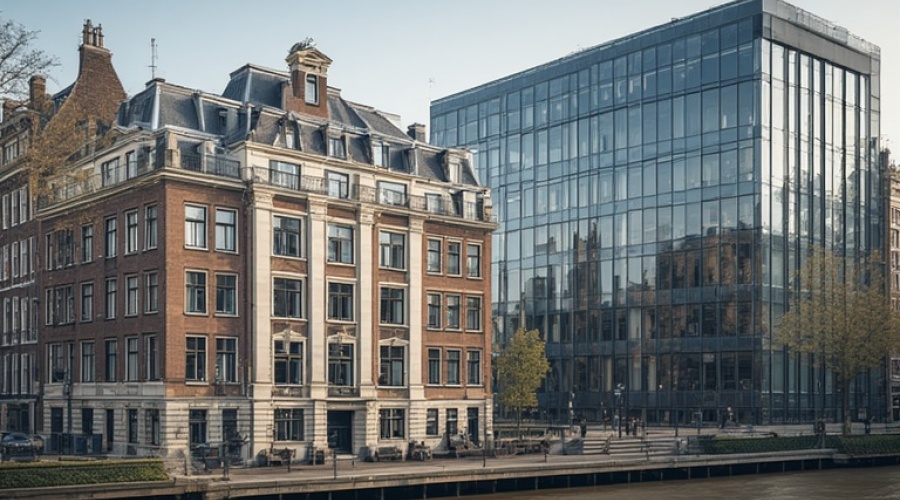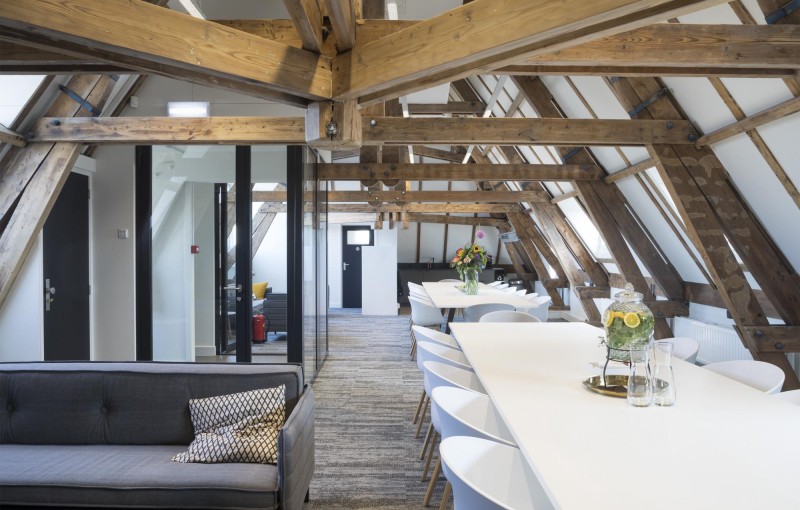
Office in a Monumental Building: Character Over Standard
✔Last reviewed: September 2025, by Jeroen van der Linde

Choosing an office location goes beyond practical considerations: it shapes your company’s image, atmosphere, and daily operations. Today, a wide range of office spaces is available in monumental properties. These buildings combine historic charm with a distinctive identity – ideal for organisations that want to stand out. But how do you know if such a location suits your business?
Rent office space with Flexas.com
The charm of a monumental office
An office in a monumental building has a unique appeal. Its historic architecture and intricate details create an inspiring environment for employees and clients alike. This can strengthen company culture, reinforce brand identity, and support market positioning. Many monumental properties are located in historic city centres, offering excellent accessibility and urban amenities – ideal for staff and business meetings.
Practical considerations
A monumental office requires a different approach compared to modern buildings. Specialist maintenance, energy efficiency measures, or sustainability upgrades may be needed. Often, the landlord is responsible for these aspects, but tenants should confirm what is covered in the lease.
It’s important to note that any alterations – internal or external – often require Listed Building Consent under UK law. This can include installing modern facilities such as air conditioning, new lighting, or extra data cabling. Some works may also need planning permission if they count as “development.” Securing consent can take additional time, so clarify responsibilities with the landlord early.
Routine like-for-like maintenance (for example, repairing roof tiles or repainting in the same style) may not need consent, but it should always be checked with the local planning authority.
Regulations and heritage status
The obligations for a monumental property in the UK depend on the building’s designation and its location, and they can vary significantly depending on the country or even the local municipality:
- Grade I / II* / Grade II listed buildings (UK): nationally important properties. Any alterations affecting the character – inside or out – require Listed Building Consent. Carrying out work without consent is a criminal offence.
- Conservation areas: even if a building itself is not listed, being in a conservation area can restrict permitted development and often requires planning permission for external alterations.
- World Heritage Sites or protected settings: here, both the building and its surroundings are protected, limiting visible alterations and adding specific conditions.
Building Regulations still apply to monumental buildings, but local authorities may allow sympathetic relaxations to preserve historic character, for example using traditional materials. Energy efficiency upgrades usually require consent and specialist solutions.
Because rules vary by country and even between municipalities, it is essential to check local legislation and seek pre-application advice. Many businesses also work with heritage consultants to ensure compliance and smooth the approval process.
Why companies choose a monumental property
Businesses that deliberately choose a monumental office usually do so for strategic reasons. The workplace becomes an extension of brand identity:
- Creative sector: architects, design agencies, and advertising studios find inspiration in old factories, warehouses, or historic halls.
- Professional services: law firms and wealth managers favour stately historic properties that convey authority and stability.
- Tech & startups: combining a monumental building with a modern interior highlights innovation and a disruptive spirit.
Conclusion: a strategic choice with impact
An office in a monumental property can be more than just a workplace: it becomes a powerful tool for brand identity and corporate image. At the same time, it requires careful attention to maintenance, regulations, and fit-out possibilities. Making an informed choice is essential.
Whether you opt for the historic charm of a monumental building or the practical advantages of a modern office, our specialists at Flexas.com guide you every step of the way. From analysing rental terms and renovation options to clarifying regulatory requirements and exploring alternatives – with their expertise, you’ll always find the office space that best suits your business.
Do you have questions about the possibilities or required permissions? Our experts at Flexas.com are ready to help.


